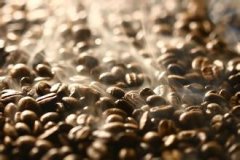The real reason why coffee fascinates us
There are about 1 billion people around the world who start their day by having a cup of coffee first thing in the morning. Among these 1 billion people, the proportion of Chinese is increasing year by year. A survey shows that 70% of Chinese people drink coffee, and 30% of them have formed the habit of drinking coffee every day. However, when we were nurtured in the fragrant and pleasant "tea culture" from an early age, we always felt a little separated from the bitter Western-style "coffee culture". Many people mention "caffeine" as if they are facing the enemy, and the report that "drinking coffee leads to calcium loss and is prone to osteoporosis" makes us not hesitate to throw it into the category of "bad drinks". What kind of effect does coffee have on health? Life King interviewed cardiovascular, oncology, digestive and other experts and found many health benefits of coffee, which surprised us.

The second largest drink after water
Apart from oil, coffee is the oldest and most traded commodity in the world. In western countries, people hurrying to work with a cup of coffee can be seen everywhere on the street in the early morning. Starbucks chain stores have sprung up everywhere in China, and even many old people can recognize its "banshee" logo at a glance. According to the statistics of the International Coffee Organization, the annual consumption of coffee in the world is 400 billion cups. Every second, 14000 cups of coffee are drunk in the world. Coffee has become the second largest drink in the world after water. Finns are among the world's top coffee drinkers, with a per capita coffee consumption of 12 kilograms in 2008. Even in some tea culture countries in Asia, coffee is becoming more and more popular, and Japan has replaced Germany as the world's second largest consumer of coffee. In the United States, more than half of people drink coffee every day, and nearly 90 percent must have coffee for breakfast. In contrast, although coffee is "well-known" in China, its "acceptance" is not high. According to the survey, the average Chinese consume less than 100 cups of coffee per person per year. Among coffee drinkers, 56% are men and 44% are women. Among them, the largest number of people aged 41 to 50, accounting for 24%, followed by those aged 21 to 30, accounting for 18%.
Ennis Doyli, one of the founders of the Coffee Scientific Information Society, pointed out that there were many misunderstandings about coffee in the past, and it was only in the past decade that coffee was regarded as a healthy drink. It is increasingly found that coffee contains not only caffeine, but also protein, fat, nicotinic acid, tannic acid, alkaloids, potassium, dietary fiber and other nutrients.
The unknown benefits of coffee
Professor Hu Dayi, a famous cardiovascular expert in China, has co-authored a book called 101 reasons for Coffee innocence with former World Heart Federation President Mario Malario and other experts. The book says that as long as you drink it properly and regularly, coffee is more protective of the heart than wine. Li Weimin, vice president of the first affiliated Hospital of Harbin Medical University and director of the Department of Cardiovascular Medicine, told reporters that caffeine can improve the systolic function of the left ventricle and the blood flow of the coronary artery, so drinking moderate amount of coffee can protect the heart and reduce the incidence of cardiovascular disease. For those who are worried about a faster heart rate, he suggests that one or two cups a day is appropriate, and one for the elderly. Not too strong, with or without sugar as much as possible.
In addition to being "spoiled" by cardiovascular experts, coffee is also respected by many other medical experts.
Coffee can prevent cancer. Liu Jinying, deputy director of the Nutrition Department of the Cancer Hospital of the Chinese Academy of Medical Sciences, recommends that the polyphenols contained in coffee are strong antioxidants. Drinking some coffee every day has a certain effect not only in cancer prevention, but also in cancer treatment.
Coffee protects the liver. "Coffee is rich in polyphenols that also protect the liver." Liu Jinying advises hepatitis patients to drink some coffee every day, which is good for the repair of liver cells. Japanese experts found that in addition to nourishing the liver, coffee can also relieve alcohol, in which chlorogenic acid can avoid alcoholism.
Coffee prevents type 2 diabetes. Many studies have shown that the incidence of type 2 diabetes is lower among coffee drinkers because a substance in coffee can reduce the absorption rate of glucose in the intestines and change the location of glucose absorption.
Coffee helps digestion. Tao Lin, deputy director of the Department of Gastroenterology of the Beijing traditional Chinese Medicine Hospital affiliated to the Capital Medical University, told reporters that meat eaters had better have a cup of coffee after meals, which has a good effect on relieving greasy and helping digestion. In addition, the content of soluble dietary fiber in coffee is higher than that in orange juice, and caffeine can stimulate the intestines and accelerate peristalsis. Therefore, drinking coffee has the effect of relieving constipation.
Coffee prevents depression. People who drink coffee regularly will feel happy and restless, and their mood will be improved. Li Weimin points out that when you are upset or depressed, having a cup of coffee can really calm your mind.
Coffee is a sports partner. Research from the University of Georgia shows that drinking two cups of coffee after exercise can help relieve muscle soreness.
It is healthiest to drink after meals.
Coffee has many benefits, but it can only be effective if you drink it right.
Choose: beware of "junk coffee". Three-in-one instant coffee is the most typical "junk coffee". Among them, coffee partners contain harmful trans fatty acids, which can increase the risk of heart disease and diabetes. The best way is to drink freshly ground coffee with coffee beans. Generally speaking, the longer the coffee beans are roasted, the more nutrients are lost, and the more bitter the coffee is, the more anxious it will be. On the other hand, the lightly roasted coffee has a sour taste. Moderately roasted coffee beans are the best, moderate sour and bitter, and have great health benefits. Fan Zhihong, a professor at the School of Food at China Agricultural University, suggested that it is best to add whole milk to drink coffee, put in 3 cups of coffee, and pour 1 cup of milk without sugar. It tastes good and healthy.
Drink: drink 2 cups a day after meals. Fan Zhihong recommends that the total daily intake of caffeine should not exceed 250 milligrams, which is equivalent to drinking 2 cups of coffee. Li Weimin reminded that drinking too much coffee will cause the heart to beat violently, and even appear in a trance, walking center of gravity instability and other phenomena. Tao Lin suggests that drinking coffee is best after breakfast and lunch, which can reduce gastrointestinal irritation. It's best not to drink after dinner so as not to interfere with sleep.
The taste of coffee exposes character.
The choice of coffee reveals one's character. British clinical psychologist Ramani de Vasula introduces the latest findings in his new book, character determines Food: changing Food, changing Life, revealing a person's personality traits from the type of coffee he chooses.
Dr de Vasula studied the behaviors and habits of 1000 coffee lovers. Dr de Vasula compared respondents' answers to common scenarios and linked them to their coffee preferences. The respondents mainly showed the following seven personality traits: introversion, extroversion, perfectionism, friendliness, observancy, sensitivity and self-confidence.
It turns out that black coffee lovers are often perfectionist. These people like to live a simple life, but they are a little elusive, impatient and stubborn. People who drink lattes like to please others, but this personality often makes others think they are too enthusiastic.
People who drink cappuccino have a strong desire for control and performance, and they are overly sensitive and serious about their health. People who like instant coffee are relatively lazy. They like to procrastinate and do not have a strong sense of time. Trendy people like chilled sweet coffee.
Important Notice :
前街咖啡 FrontStreet Coffee has moved to new addredd:
FrontStreet Coffee Address: 315,Donghua East Road,GuangZhou
Tel:020 38364473
- Prev

Seven facts about caffeine the secret of caffeine
1. Caffeine is good for both short-term and long-term memory. Earlier studies have found that caffeine is good for short-term memory, while recent studies have found that caffeine is also good for long-term memory. Dr. Jacqueline London, senior dietitian at Mount Sinai Hospital in New York, said eating 300 to 400 milligrams of caffeine a day can help prevent cognitive decline and prevent Alzheimer's disease. two。 Caffeine can be extracted.
- Next

Analysis of the advantages and disadvantages of drinking coffee
The word coffee comes from a small town in Ethiopia called Kafa. In Greek, Kaweh means strength and passion. Tea, coffee and cocoa are called the three major drinks in the world. Today, nutrition and health care will take you to understand the advantages and disadvantages of drinking coffee. Friends who are interested might as well learn about it. First, the benefits of drinking coffee. Coffee contains certain nutrients. Coffee
Related
- Beginners will see the "Coffee pull flower" guide!
- What is the difference between ice blog purified milk and ordinary milk coffee?
- Why is the Philippines the largest producer of crops in Liberia?
- For coffee extraction, should the fine powder be retained?
- How does extracted espresso fill pressed powder? How much strength does it take to press the powder?
- How to make jasmine cold extract coffee? Is the jasmine + latte good?
- Will this little toy really make the coffee taste better? How does Lily Drip affect coffee extraction?
- Will the action of slapping the filter cup also affect coffee extraction?
- What's the difference between powder-to-water ratio and powder-to-liquid ratio?
- What is the Ethiopian local species? What does it have to do with Heirloom native species?

